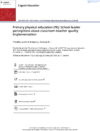Abstract
Quality physical education (QPE) in primary school optimises children’s well-being. However, international research indicates that the preparation of classroom teachers is impeded by systemic barriers, resulting in low-classroom teacher confidence, competence and subsequent interest. This empirical research investigates school principal [headteacher] perceptions of how quality physical education in primary schools is implemented. The 73 principal [headteacher] participants were randomly selected to represent a cross-section of Government Primary School communities, in a region, where PE responsibility lies with classroom teachers; New South Wales (NSW), Australia. Data were gathered using ex-post facto surveys embedded within an interpretivist paradigm. The questionnaire formulated open-ended questions providing principals [headteachers] with the opportunity to express themselves, and closed-ended questions where they chose the category that best described their school. Findings suggest the largest barrier for QPE in primary schools is the qualifications and preparation of teachers. It is recommended that opportunities for developmentally appropriate primary education PE specialisms be provided within degrees, allowing every primary school over time to have a sustainable infrastructure of PE expertise and advocacy. This recommendation will in time provide QPE experiences for all children; offering global direction for learning in the physical dimension and consequently, optimise holistic education.



Responses